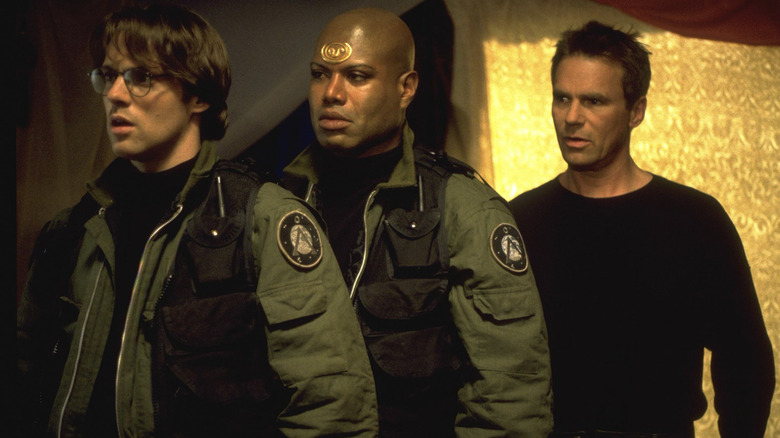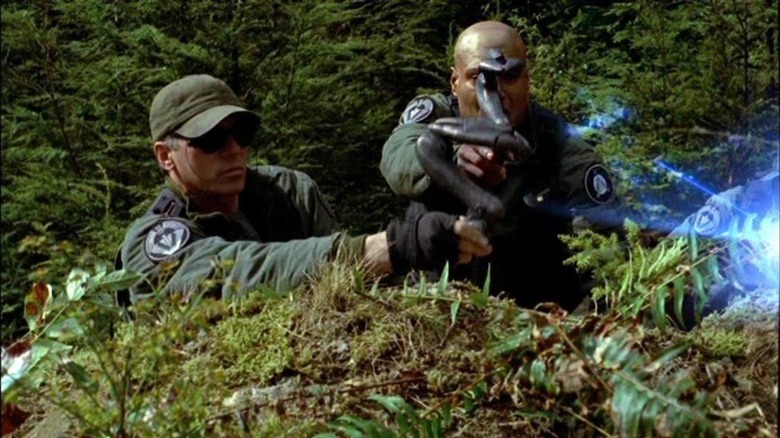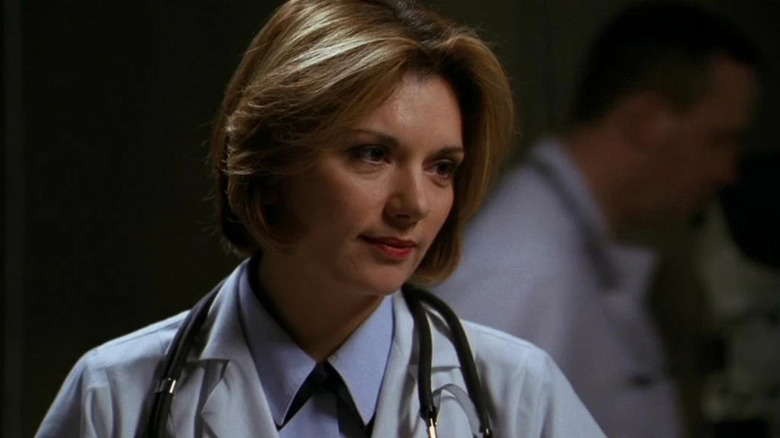Stargate SG-1's Co-Creator Has Two Regrets Over The Sci-Fi Series
The premise of the 1997 sci-fi series "Stargate SG-1," which spun out from the 1994 movie, is fun. The American military has in their possession a series of ring-shaped Stargates that can instantaneously transport them to distant planets. The Stargates had previously been used by ancient aliens to infiltrate Earth and pose as deities; the gods of Egypt were in fact conquering extraterrestrials called the Goa'uld. The military uses the Stargates to travel to distant worlds and gather powerful weapons technologies, hoping to use them to defend themselves from the Goa'uld. Alien weapons are a major factor throughout the massive "Stargate" franchise.
Of course, the ensuing mythology of "SG-1" becomes massively complicated, and only deep-cut fans will be able to give a casual reader all the necessary details to understanding the original series and its multiple spin-offs; after completing all 10 seasons of the original show, one might also want to watch "Stargate Infinity," "Stargate Atlantis," and "Stargate Universe." There's a lot of lore to learn.
About the weapons, though, one of the most common was the zat'nik'tel, a handheld, snakelike energy pistol commonly handled by all of the show's main characters. It was operated by grasping the "tail" end of an S-shaped snake machine, and squeezing the trigger, blasting out an energy pulse from its "mouth." The pulse moves in a corny-looking sine-wave pattern. They seem to be electrically based, and can be used to short out certain electrical devices. A single shot from a zat'nik'tel, nicknamed a zat gun, will stun and hurt a target. A second shot will likely kill them, and a third will vaporize them entirely. Zat guns don't look like ordinary handguns or phasers, making them unique to "Stargate."
But according to "Stargate SG-1" co-creator Brad Wright, addressing fans on a 2022 Reddit AMA, zat guns were kind of dumb.
Zat guns are dumb
In the above photo, one can see a zat gun in action, and perhaps understand Wright's opinion. When asked what his biggest regret for "Stargate" was, Wright merely responded, "Zat guns. Just dumb." Handguns, and even other fantasy weapons like "Star Trek" phasers, are generally designed to rest ergonomically in one's hand, allowing the user to extend their arm naturally, hold it up with another hand if necessary, and look down the weapon's aiming sights. Such weapons are then operated by squeezing a trigger or pushing a button with the thumb; phasers operate a lot like modern remote controls.
In contrast, zat guns are held gently like a scanner, with the body of the weapon extending up from the hand. Such a design would only put undue weight onto a user's extended arm. It would also make looking down aiming sights incredibly difficult, forcing the user to hold it a very specific way. To the designer's credit, the zat guns were designed by an alien species, and not intended for use by human hands, but that doesn't mean they didn't look silly on screen.
Also the "one, two, three" rule seemed a little arbitrary. Why incorporate a "disintegrate" setting, when there's already a kill setting? I suppose the alien designers of zat'nik'tel felt that one shot was a warning, and the second meant serious business. The third, I suppose, it just for murderers who don't want to bother with cleaning up the body afterward.
The death of Dr. Fraiser
In that same Reddit Q&A, Wright also noted that there was a major plot point that he wishes he hadn't overseen. He didn't like that the show continued after the death of Dr. Fraiser (Teryl Rothery). "Also, we thought when we killed Dr. Fraiser that it was going to be the final season," he said.
The character of Dr. Janet Fraiser was a recurring character since the show's fifth episode and was usually seen back at the military sick bay where she would treat wounds. In the show's seventh season, in a two-part episode called "Heroes," Dr. Fraiser was killed after sustaining an alien weapons blast to the chest.
One can see how killing a recurring character might raise the stakes in a long-running TV series, but one can just as easily see how it smacks of writerly desperation. A major character is killed only after the writers have run out of ideas. Had Dr. Fraiser died near the end of the series, it might have felt more dramatic — the show is ending, and so are the characters. Wright, however, was upset to learn that "Stargate" was going to be renewed for three additional seasons after Dr. Fraiser died, making her death seem abrupt and incidental. It sounds like, if he had known the show was going to continue, Dr. Fraiser would have survived.
Rothery would return for one additional episode anyway. In "Ripple Effect," the Stargate team found their members being swapped out for parallel universe versions of themselves, leading to the parallel universe resurrection of Dr. Fraiser. The character, however, remained in her native universe.
It's funny how multiverse stories actually rob a narrative of tension, and don't make stories more interesting. I wonder if any other major entertainment franchises have tried it.


